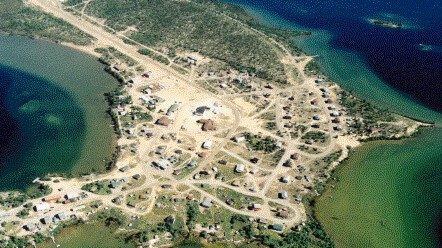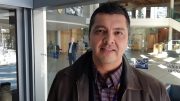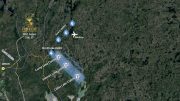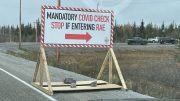CKLB reached out to each candidate for chief in the four Tłı̨chǫ communities.
The same three questions were asked to each candidate and here is what they had to say.
The transcription has been edited for clarity and accuracy.
Gamètì
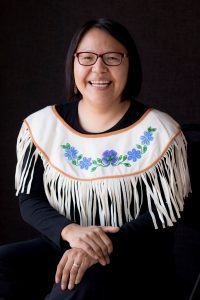
Doreen Arrowmaker is running for chief of Gamètì. (Photo courtesy of Doreen Arrowmaker.)
Doreen Arrowmaker
Q: Tell me, why are you running for chief of Gamètì?
A: I spent the better part of my life, 25 years or more, in the administration field. I have a strong administration background and policy development, financial management, reporting, staff development. I felt that I could use the skills that I’ve learned in the position of chief.
I know I have strong leadership qualities such as honesty, integrity, having a vision and goals. Working hard to get an education, you need qualities like time management, discipline and commitment. I feel that I have these because I have completed a couple of different programs in academia — I’m actually pursuing my second Master’s.
And I feel that the vision of Chief Jimmy Bruneau — to be strong like two people — I have that. Because I have the educational background and a strong cultural background.
And why I agreed to accept this nomination was because I see a lack of transparency and accountability within our government system, within our community. At the end of the day our government needs to be accountable to the people, when leaders get elected, they get elected by the people, for the people.
We need to look to our own government and the departments and try to figure out that there are solid policies and procedures in place. And if there are not, then where do we need to create these to strengthen that and to be fair. We need to have a solid communication plan in place so that people know, what is being done and how it’s being done.
I also always hear concerns at the annual gathering, every year for the past 16 years since self-government, and these same questions and concerns are raised yearly. And I feel that these concerns need to be taken and put into action and how we can move forward. I believe that now is the time that we need to start listening to the people and hear their concerns. Because at the end of the day, our priority should be the well-being of our people, because if it weren’t for the people, many people who are in the position of leadership wouldn’t be there.
Q: And so tell me Doreen what is the most pressing issue to Gamètì right now?
A: I feel that the community needs a lot of infrastructure and improvements on these infrastructures. We can look for funding to put in an arena for the young people, a fitness center for those who want to take the path of wellness, an actual cultural center that can accommodate people.
Things like community parks and camping grounds and day use areas are some of the infrastructure needs that I see.
And then another concern that that people have expressed that I’ve also noticed is with leadership. The fact that a lot of people have a lot of concerns, confusion, because they don’t know what is being done and how things are being done.
They don’t hold regular public meetings to provide regular updates to the citizens. And I believe that newsletters and having regular public meetings, keep people informed and to reduce this confusion that people have.
The community level and employee morale, we need to find ways to increase employee morale, because I feel that there’s a lot of people that aren’t happy. Because they don’t have access to training, they need ongoing training support and how do we provide that?
And if people want employment, employment advancement, like how do we provide employment advancement opportunities. And we need to look at things like are there sufficient leaves in place, such as cultural days?
And if you’re working in groups with people, then how do we build teams? We got to re-evaluate the organizational structure and find ways to help so you feel valued and respected, to increase productivity and providing the support that employees need. These are some of the things that I’ve noticed at the community level.
Mary Rose Blackduck interviewed Doreen Arrowmaker in Tłı̨chǫ Yati
Q: How will you go about ensuring that there is infrastructure in the community?
A: I think now a lot more organization and funding partners or funding agencies are more inclined to support pilot projects, rather than a project because a pilot project sounds more interesting than just projects.
So the way to tackle that is finding more funding partners through outside agencies or look for agencies that provide infrastructure needs.
I can tell you off the bat, I know of an organization called New With Horizon Infrastructure Fund [Horizon West Infrastructure Fund] , they’re based out of Saskatchewan, and they provide infrastructure needs to First Nations, that could be another avenue to look into, for infrastructure needs.
And we also have an IBA in place, why don’t we utilize the IBA and start building legacy projects in each of the communities? That can be another option too.
You just have to know the right people and talk to the right people. And I feel that because I’ve taken an international program, and I’ve already developed strong relationships with my fellow cohorts from across Canada. So I feel that a lot of the people that I’ve gone to school with are CEO’s, managers in different capacities with different organizations. I can probably call them up and say, ‘do you know anything like this?’ and they’ll they’ll probably help me with stuff like that.
That’s another benefit, that I’m so blessed to have gone to school and that and that I come across many people like that. So I think I have the network of key stakeholders that I could probably use and partner up with.
Frank Arrowmaker
CKLB reached out to Frank Arrowmaker, but was unable to arrange an English interview in time for publication.
Listen to Mary Rose Blackduck’s interview with Frank Arrowmaker in Tłı̨chǫ Yati

